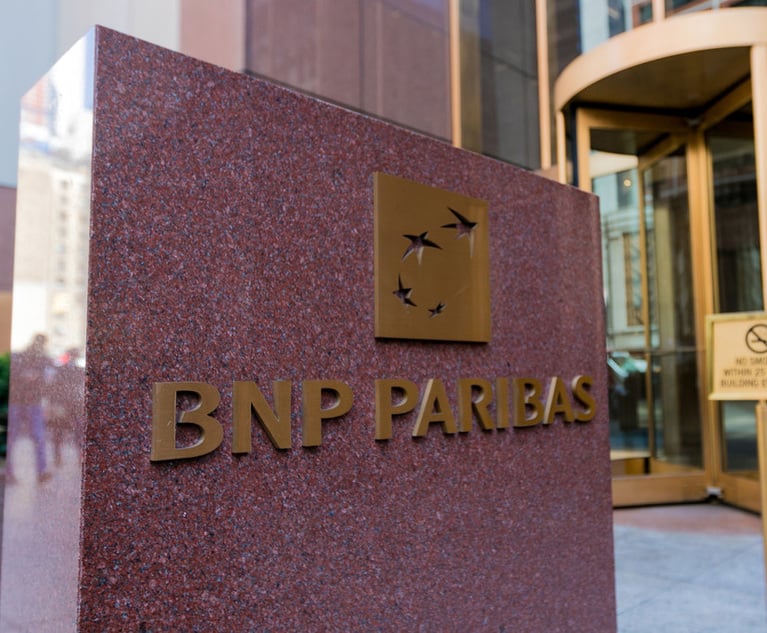 Jeremy H. Temkin
Jeremy H. Temkin Civil FBAR Penalty Litigation: No Reprieve for Taxpayers
In this edition of his Tax Litigation Issues column, Jeremy H. Temkin discusses recent decisions that reflect a continued judicial antagonism to taxpayers' attempts to avoid civil penalties and the rejection of attempts to cap such penalties.
March 17, 2021 at 12:40 PM
9 minute read
On Feb. 18, 2009, the Department of Justice entered into a Deferred Prosecution Agreement with UBS AG. Since that time, the government has aggressively pursued taxpayers who maintained undisclosed offshore accounts. While tens of thousands of taxpayers have cured their historical non-compliance through Offshore Voluntary Disclosure Programs or Initiatives offered by the IRS, approximately 100 taxpayers who failed to make timely voluntary disclosures were subject to criminal investigation and prosecution, with the associated exposure to loss of liberty and financial penalties. A second, more fortunate, subset of the non-compliant taxpayers who did not participate in a voluntary disclosure program were subjected to IRS audits, which carried the potential for substantial civil penalties without the risk of incarceration.
By statute, the maximum civil penalty for taxpayers who willfully fail to file Reports of Foreign Bank and Financial Accounts (FBARs) is the greater of $100,000 or 50% of the balance in the undisclosed account(s) at the time of the violation. This column has previously addressed both the difficulty taxpayers face in arguing that their failure to disclose offshore accounts was non-willful, see Jeremy H. Temkin, The Next Frontier: Civil Penalties for Undisclosed Offshore Accounts, N.Y.L.J. (Jan. 18, 2018), and the potential for capping penalties substantially below the statutory maximum, see Jeremy H. Temkin, FBAR Penalties: Relief for Taxpayers?, N.Y.L.J. (Jan. 17, 2019). Recent decisions have reflected continued judicial antagonism to taxpayers' attempts to avoid civil penalties and the rejection of attempts to cap such penalties.
This content has been archived. It is available through our partners, LexisNexis® and Bloomberg Law.
To view this content, please continue to their sites.
Not a Lexis Subscriber?
Subscribe Now
Not a Bloomberg Law Subscriber?
Subscribe Now
NOT FOR REPRINT
© 2025 ALM Global, LLC, All Rights Reserved. Request academic re-use from www.copyright.com. All other uses, submit a request to [email protected]. For more information visit Asset & Logo Licensing.
You Might Like
View All
The CFPB Is Digging In for Last Days of Biden's Term. But What Happens Next?
6 minute read

NY AG James Targets Crypto Fraud Which Allegedly Ensnared Victims With Fake Jobs
4 minute read
'Merciless' Filing Deadline Dooms Cuban Americans' Property-Trafficking Suit Against BNP Paribas, SocGen
4 minute readLaw Firms Mentioned
Trending Stories
Who Got The Work
J. Brugh Lower of Gibbons has entered an appearance for industrial equipment supplier Devco Corporation in a pending trademark infringement lawsuit. The suit, accusing the defendant of selling knock-off Graco products, was filed Dec. 18 in New Jersey District Court by Rivkin Radler on behalf of Graco Inc. and Graco Minnesota. The case, assigned to U.S. District Judge Zahid N. Quraishi, is 3:24-cv-11294, Graco Inc. et al v. Devco Corporation.
Who Got The Work
Rebecca Maller-Stein and Kent A. Yalowitz of Arnold & Porter Kaye Scholer have entered their appearances for Hanaco Venture Capital and its executives, Lior Prosor and David Frankel, in a pending securities lawsuit. The action, filed on Dec. 24 in New York Southern District Court by Zell, Aron & Co. on behalf of Goldeneye Advisors, accuses the defendants of negligently and fraudulently managing the plaintiff's $1 million investment. The case, assigned to U.S. District Judge Vernon S. Broderick, is 1:24-cv-09918, Goldeneye Advisors, LLC v. Hanaco Venture Capital, Ltd. et al.
Who Got The Work
Attorneys from A&O Shearman has stepped in as defense counsel for Toronto-Dominion Bank and other defendants in a pending securities class action. The suit, filed Dec. 11 in New York Southern District Court by Bleichmar Fonti & Auld, accuses the defendants of concealing the bank's 'pervasive' deficiencies in regards to its compliance with the Bank Secrecy Act and the quality of its anti-money laundering controls. The case, assigned to U.S. District Judge Arun Subramanian, is 1:24-cv-09445, Gonzalez v. The Toronto-Dominion Bank et al.
Who Got The Work
Crown Castle International, a Pennsylvania company providing shared communications infrastructure, has turned to Luke D. Wolf of Gordon Rees Scully Mansukhani to fend off a pending breach-of-contract lawsuit. The court action, filed Nov. 25 in Michigan Eastern District Court by Hooper Hathaway PC on behalf of The Town Residences LLC, accuses Crown Castle of failing to transfer approximately $30,000 in utility payments from T-Mobile in breach of a roof-top lease and assignment agreement. The case, assigned to U.S. District Judge Susan K. Declercq, is 2:24-cv-13131, The Town Residences LLC v. T-Mobile US, Inc. et al.
Who Got The Work
Wilfred P. Coronato and Daniel M. Schwartz of McCarter & English have stepped in as defense counsel to Electrolux Home Products Inc. in a pending product liability lawsuit. The court action, filed Nov. 26 in New York Eastern District Court by Poulos Lopiccolo PC and Nagel Rice LLP on behalf of David Stern, alleges that the defendant's refrigerators’ drawers and shelving repeatedly break and fall apart within months after purchase. The case, assigned to U.S. District Judge Joan M. Azrack, is 2:24-cv-08204, Stern v. Electrolux Home Products, Inc.
Featured Firms
Law Offices of Gary Martin Hays & Associates, P.C.
(470) 294-1674
Law Offices of Mark E. Salomone
(857) 444-6468
Smith & Hassler
(713) 739-1250






